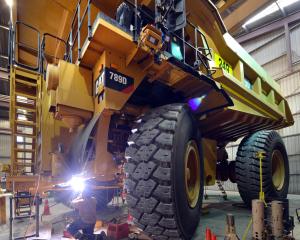Reaction has been muted to a potential billion-dollar mining investment in New Zealand by Chinese company, the Qinghua Group.
Mining lobby groups have tentatively welcomed the Chinese interest, the Government is non-committal at this early stage, while the Green Party was more vocal and immediately decried any form of the use of lignite.
The Qinghua Group is understood to be China's largest privately owned energy and mining company, headed by chairman Qinghua Huo and its smaller joint venture partner Greywolf Goldmining from Sydney, which holds some coal permits and is spearheading its possible entry into New Zealand.
Nothing has been purchased by the Qinghua Group, but the company has visited New Zealand repeatedly in recent months to inspect mainly coal, hard coking coal and lignite deposits which could in turn be converted to petrochemicals, steel or used for electricity generation - which are Qinghua's mainstay of production from dozens of subsidiary companies around China.
The Government has for the past two years been promoting the resource sector as a potential cornerstone of economic recovery, taking a "stocktake" of mineral wealth and providing millions in additional funding for geological survey work, but it also had to back down from suggesting protected land within national parks be opened to mining.
Contacted yesterday, Minister of Resources and Energy, Gerry Brownlee was non-committal about Qinghua's intentions in New Zealand, saying reports of its visits were "interesting".
He said, that in general, any foreign investment in New Zealand would include protection of the Crown's revenue, from tax and royalties.
He noted state-owned enterprise Solid Energy is similarly considering lignite conversion options.
Green Party co-leader Dr Russel Norman said when contacted it would be "reckless" and "hugely irresponsible" to mine lignite for conversion to petrochemical, fertiliser or any form of energy use.
"Using coal is really bad [for carbon emission] but the problem with lignite is it is so low in energy, petajoules," he said.
He estimated widespread mining of lignite and conversion by burning would possibly create carbon emissions "one hundred times larger" than the country's present output.
"It would become a major polluter . . . there would be massive carbon emissions which would just be environmentally irresponsible,' Dr Norman said.
Chief executive of the Mining Industry Association, Doug Gordon, welcomed the interest shown by the Qinghua Group, "They're examining a range of exciting prospects over a wide spectrum of minerals sector opportunities, some of which, by their nature - such as coal and steel making - have the potential to synergise with each other in a complimentary way.
The Government and its permitting agency, Crown Minerals, are promoting New Zealand as highly prospective for base, precious and industrial minerals, and coal, oil and gas exploration, so long as those companies operate in an environmentally responsible manner with world-best health and safety practice, he said.
"We have a keen workforce, good energy, infrastructure and business frameworks of the highest integrity," Mr Gordon said.
The association had been highlighting "for some time" that with the improved policy and regulatory settings, direct foreign investment might be attracted to sensitively develop some of New Zealand's mineral potential, which would boost every New Zealander's standard of living.
Chief executive for pro-mining political lobby group Straterra, Chris Baker, said when contacted it was "always good" to see oversees interest in investing in New Zealand.
"We have great potential, but potential investors need to recognise the importance New Zealanders place on maintaining high standards of environmental management. We are open for business, but on our terms," Mr Baker said.




